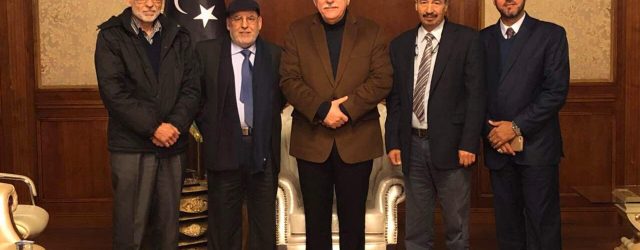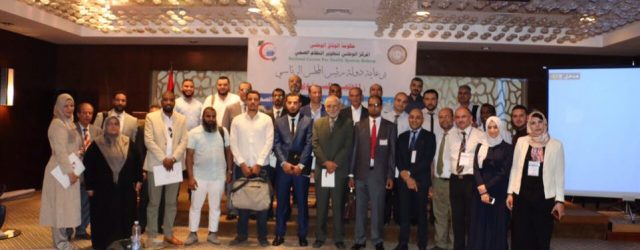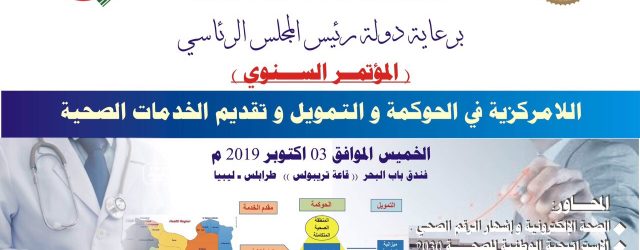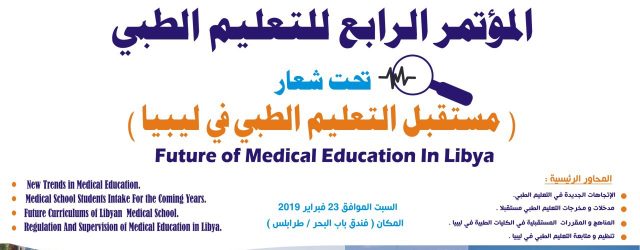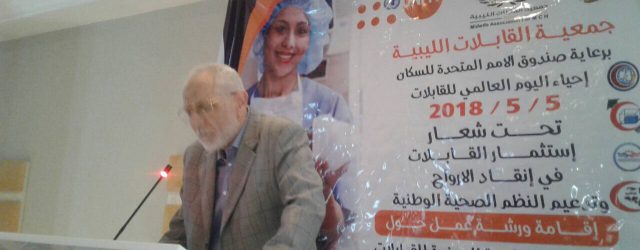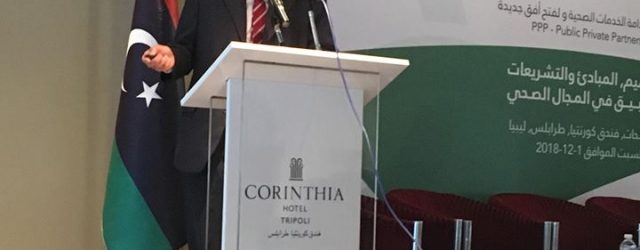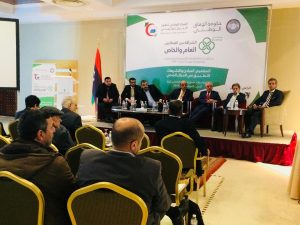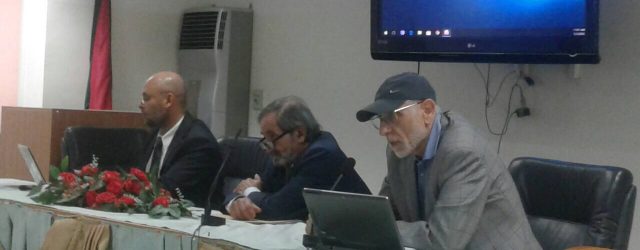International Accreditation of Medical Graduates
From Selection to National Exam
Tripoli University-Rashid Kaabar Hall
Saturday 11th November 2017
Report Content
- Introduction
- Conference Recommendations
- Annexes:
- Conference Agenda
- Conference Presentations
- Record of conference debate (Q&A and Brief Statements)
- Conference Attendance Record
Introduction
The undergraduate medical education in Libya has suffered long time of under-investment with slow deterioration of its institutional outcome. This is reflected on the level of graduates and their chances to be accepted for postgraduate education by international universities. The international accreditation of medical schools is yet another threat to the Libyan graduates as there is a chance that their Bachelor degree will not be recognised if their medical school is not registered and accredited.
Since the Rixos Conference in 2012, two medical education conferences were held and supported by the EU-LHSS programme aiming to improve the medical educational output. The first conference was in 2014 and the second was in 2016.
This conference is organised by the University of Tripoli as a continuum of the activities of the previous two conferences. It is sponsored by the EU-LHSS and Libyana.
In this report, we summarise the conference activities and discussions and outline its main recommendations.
Organisation and Administration:
The Conference is chaired by Prof. Samir Sager, and the scientific committee is chaired by Prof. Fauzi Sagher and The Steering committee conducted many meetings in preparation for the conference and sent invitations for some international Libyan Experts in Medical Education to participate over Zoom.us. The venue was decided to be at Rashid Kaabar Hall at the University of Tripoli and the date decided to be on Saturday 11th November 2017. The conference agenda is included in the annexes.
On Saturday 11thNovemember 2017, registration started at 8:30 and the conference commenced as scheduled at 9:00 am. The Dean of the University of Tripoli and The Dean of Faculty of Medicine attended the event.
Content and discussion:
First Session from 9:00 to 10:00, Introductory Session:
The first session was a welcome ceremonial session where representatives of the university, medical school and the organising committee gave their speech followed by a presentation rationalising the need for change and another that shows the Vision from the students perspective.
- The first speaker was Prof. Samir Sager, the chair of the conference where he welcomed the floor and talked about the importance that the workers in the health field should have the necessary skills to ensure quality and patient safety, he also pointed that to ensure quality we should work to fulfil the requirements to be accredited internationally.
- Then Dr. Nabil Nattah, the Dean of Tripoli University showed the support of the University administration for change and moving forward in improving medical education as it is the gate to improve the health system in Libya. Before closing his speech he conveyed the apologies of the Minister of Education for not being able to attend the conference due to unforeseen reasons.
- The third speaker was Dr.Faten Ben Rajab, the Dean of Faculty of Medicine, she pointed to the implementation of the accreditation principles by the year 2023 and she referred to the efforts of Prof. Mustafa Gawas , , the late Dean ,for supporting and Prof. Fauzi Sagher , head of the curriculum reform committee, for their efforts in submitting a proposal for a new curriculum that is in line with the concepts of the accreditation requirements.
- The fourth Speaker was Dr. Khaled Maghboub, the chair of the organising committee of the conference, who mentioned that the move to the new system will take years and it will need the collaboration of all including ,of course, the medical students.
- The fifth speaker in the first session was Prof. Mustafa Gawas ,the late dean of the faculty of Medicine who gave a presentation under the title “Why we need to change? ”, in his presentation he gave his vision of having the faculty of medicine accredited and leading the medical schools in Africa in the coming five years. He said that the work done so far is targeting to put the faculty of medicine among the top 500 colleges internationally.
- The last presentation in the first session was presented by a group of medical students, Al-Zahra Maghrabi, Muad Abudaber and Tymaa Alzwai who gave a shared presentation under the title “Students Vision 2020”, they went through the accreditation and ranking process and the role of the international organizations such as WFME, ECFMG, WDMS. They also pointed to the fact that Libya still doesn’t have an accrediting agency for medical education on Dora List. They went through the process of students activities in lines of accreditation and also explored the difficulties that may face them. The audience were impressed by their presentation Style ,preparation ,technique and fluency in English.
Second Session (The Biomedical Sciences) 10:35 – 11:55:
Chairs: Prof. Ibrahim Fhail Alboum and Dr.Rihab Hussain
The second session covered the student selection and the proposed curriculum for the first three years+ that qualifies the student to get integrated Bachelor in BioMedical Sciences (B.M.Sc).
- The first speaker was Dr. Ahmed Zaid whose presentation title was “Student Selection” ; in his presentation he went through the current regulations for accepting medical students that is giving the right of all scoring 85% or more in their secondary school exit exam to register in the faculty of medicine. He also went to the problems of more students being accepted in the year 1999-2000. Then he mentioned that in the year 2013 the faculty of medicine adopted the semester system in the basic medical years and recently an acceptance written exam is adopted as the basis of acceptance in the faculty of medicine.
- The second speaker was Prof. Fauzi Sagher, the head of the new curriculum Reform committee, who presented “System Based Biomedical Curriculum & Digestive Module”: Where he introduced the new proposed curriculum and gave the justification why we need to reform, taking in considerations the problems of the current curriculum system, he went through the new curriculum in brief in each semester/ modules and then used the Digestive Module to cast more light in details, in weeks and days of 8 weeks module.
- The third speaker was supposed to be Prof.Al-Hadi Abu Rawi, Senior paediatritian from UAE whose presentation was “Integrated Bachelor of BioMedical Sciences”, but due to connection issues this presentation was not given.
Discussion and comments (First and Second Sessions):
Dr.Alzubaidi, Professor of paediatrics:
Did you study the effects in the schools that have more students being accepted specially in faculty of medicine?
Dr. Nabil Nattah,
the University Dean: The Ministry of education is currently conducting an analysis of what make some schools perform better than others and the results will be published when ready.
Dr. Othman Shibani, Forensic Medicine:
He is optimistic for the future of medical education and mentioned his experience when was studying at University of Luzan in Switzerland. He also talked about that the university teaching programmes and postgraduate education should serve the required outcomes and lastly he supported the move of the faculty of medicine towards accreditation.
Dr. Mohamed Abu Shekiwa, department of Microbiology:
what is the fate of those not accepted through the acceptance exam? Do they have a second chance or are they directed to other faculties?
Dr. Ahmed Zaid:
They have a second attempt that they may sit or they may apply to other faculty.
Dr. Salma Abu Khatwa, Dean of Faculty of Pharmacy, LIMU.
I have noticed that most of the activities in the proposal is mainly lectures and practical and there are no seminars or tutorials which she believes is more important for student centred teaching. She also suggested changing the phrase “Free Day” mentioned in the proposal to a “Landscape Hours” that to be spent in library or research.
Prof. Fauzi Sagher
We have to cover the required teaching hours as per the curriculum in order to be eligible to get the Bachelor Degree and this dictates the number of lectures and practical/discussions in the curriculum, within 3years / 6semesters / 16 weeks per semester,5 days a week plus the 3 months of (CPT) complementary practical training.
Dr.Abdulsalam Remali, Faculy of Dentistry
Faculty of Dentistry have a bad experience with the semester system in terms of timing, this led to reduction in the theoretical hours in order to complete the semester in the scheduled time, are you prepared to face this problem?
Prof. Fauzi Sagher:
Many issues and problems will appear when implementing any new curriculum that will need proper analysis ,evaluation and critical thinking to solve.
Dr.Usama Fezzani, Chair of the National Centre for Accreditation.
We do have an accreditation body in Libya since 2006 and may be it is not functioning as expected due to current situation and still you may apply to centre for the national accreditation.
Prof. Fauzi Sagher
What is meant when a speaker said that we don’t have an accreditation body as per Dora List is the accreditation of the Medical Education Programme and the outcomes by independent body and not just the registration of the Medical School.
Prof Mustafa Gawas:
We need a National Accrediting Body in Libya to be accredited Internationally.
Dr.Usam Fezzani
Our Centre is accredited from the Arab and International Network of accreditation and we will send you the supporting documents for this.
Dr. Jamal Suwayeh, Faculty of Dentistry
He showed his worries that these efforts are adopted by the faculty of medicine while still the faulty of dentistry and the faculty of pharmacy didn’t start thinking of the accreditation process. He also asked if the faculty of medicine is having a role in the premedical years.
He also asked if the faculty of medicine accepts medical students from other universities.
Prof. Mustafa Gawas:
He answered that there is no premedical year in the new system and the whole curriculum is under the control of the faculty of medicine.
Dr. Ahmed Zaid
The numbers of students applying to move from other faculties of medicine is quite few and is limited to those whose parents have a decree from ministry of labour mobilising them to work in Tripoli.
Third Session “Clinical Sciences” 11:55- 13:00
Chairs: Prof. Ibrahim Zubaidi and Prof. Mohamed Dekna
The speakers in this session casted more light on the clinical component of the new curriculum and the incorporation of clinical skills training and including the internship year to be part of the curriculum.
- First presentation was shared between Dr.Lubna Maghour, Director of Clinical Skills Lab / department of gynaecology & obstetrics and Prof. Hamida Sahli, department of paediatrics, the title of their presentation was “Clinical Skills Lab”;Dr. Lubna started the presentation the history of establishment of the skills lab in 2012 mentioning its benefits and presented the proposed skills lab programme in the new curriculum which will start from first year second semester in system wise. Then Dr.Hamida Sahli presented the experience of the department of paediatrics in simulation training for the fifth year medical students in a pilot small study.
- The second presentation was “Integrated Clinical Rotation and training” presented by Dr.Arabi Gomati, department of surgery, where he presented the new proposed curriculum for the 3 clinical years labelled as Phase 2 ,first term 18 months Clinical Sciences rotation. He then went through describing the term 2, 18 months (CCP) complementary clinical practice, “Foundation 1” (previously known as internship period) and the proposed assessment during and at the end of each training period.
- The third speaker was Dr.Faten Ben Rajab, department of paediatrics whose presentation title was “Paediatric Model” where she went into more details of the paediatric curriculum as an example of the Clinical Sciences Phase2 Curriculum both term 1 and 2, emphasizing on the role of ILOs and the formative and summative assessments.
- The fourth speaker in this session was Dr.Meluda Al-Hamadi, department of community medicine. Her presentation title was “Complementary Clinical Practice”. She visited in more details the complementary clinical practice phase2, term2 and how weeks were divided between different specialties in this Term introducing the log book and supervisor assessment Report of Family and Community Medicine as a Model.
Lunch Break
Fourth Session, Licence to clinical practise: 13:45 – 15:00
Chairs: Prof. Mustafa Gawas and Dr. Murad Ghrew
This session discussed what is after graduation with focus on ensuring that graduates will be at the standard aimed, it discussed the national exam with different possible alternatives and the process of accreditation.
- The first talk was on the “National Exam”, the presentation shared between Dr. Murad Ghrew, Department of Medicine and Prof. Mahdi Khammas, Department of Surgery at Ohio State University. The first part that was presented by Dr. Ghrew focused on why we need a national exam and the issues of patient safety as one of the main justification for standardisation. He also gave examples of what is implemented in USA and what is planned to be implemented in the UK soon supporting the standardisation of graduates. This could be any from a national exam. to a national standards that has to be fulfilled by all recognised medical schools.
- Prof. Mahdi Khammas, then took the flow through Zoom and presented the experience at the Ohio State University, he explained the concepts of educational licence and the permanent licence and then went in brief on the different steps of the US.MLE steps. He then discussed the importance of credentials and privileges as a way of standardising care and ensuring patient safety. He summarised the answer of why we need such an exam. into three phrases; to maximise patient safety, standardise the outcome and minimise the cost. He insisted on having a time line, measurable indicators and a continuous data collection and reviews.
- The second speaker was Prof. Ibrahim Bait Almal, Faculty of Medicine, University of Misurata, his presentation title was “The concept of accreditation”: He stressed on the importance of quality development and quality assurance and accreditation and went through different definitions related to these concepts. He explained the process of educational accreditation and the WFME 9 universal themes of standards. He stressed on the need for a formal political commitment for the accreditation process and that the resistance to change is expected and should be taken as a challenge and be prepared for.
Discussion and Comments (Third and Fourth Sessions):
Prof. Mustafa Gawas, department of gynaecology
Suggested to explore the possibility to ask an independent international committee to run the national exam after completing the course of medicine and the foundation period 1&2.
Dr.Murad Ghrew
The principle is that who examines, is the one who issue the certificate, so we can cooperate with international examiners but the exam should be run by either the ministry of education or other independent national body who gives the licence. The examiners themselves should be prepared for conducting such exam.
Prof. Ibrahim Bait Almal, Misurata University
Standards should be put and implemented first then accreditation is requested.
Dr. Jamal Al-Swayeh, Faculty of Dentistry
The proposal is good, but there should be a clear path for those who fail in midway. A plan for awarding them a Bachelor of Basic Medical Sciences B. M Sc is a good option
Dr.Usama Fezzani, Chair of the National Centre for accreditation
What we do in our centre is accreditation of centres and programmes, the national exam we consider as accreditation of persons to practice medicine. The NARS criteria are not in the scope of our work but we may collaborate with the faculty of medicine to build a national accrediting system for medical and paramedical professionals.
Dr. Salma Abu Khatwa, LIMU.
Commented on NARS and that it is now moved to Competency Based Medical Education in the medical profession which means in other words NARS+ Behavioural Skills, this led to production of competent professionals who can work from day one.
Dr.Yahia Al-Kamali, Tutor at Faculty of Medical Techonology
Raised the issue of the need to unify the definitions and terminology of medical and technical professions in the country. He also stressed that the salaries and incentives should be linked to experience and work delivered.
Dr. Othman Shibani, Forensic medicine.
Commented that there is a big challenge in implementing the new system . He stressed on the roles for accepting new teaching staff member that should serve this change.
Dr. Mustafa Gawas, department of gynaecology
Mentioned that a study was conducted in 2011 with the support of the Australian Embassy in Libya aimed to deliver suggestions on improving the medical education in Libya.
Dr.Murad Ghrew, Department of medicine
Commented that educational process should focus on patient safety and to allow safe graduates to practice. The General Medical Council has been recently formed to put the standards that guarantee patient safety and we will build on the experience of others in this.
Fifth Session: New Topics- 15:00 – 16:15
Chairs: Dr. Mohamed Abushkiwa and Dr.Khamis Al-Mabrouk
In this session, speakers presented their experience in new topics to be included in medical education such as bio-risk management, research methodology, bioethics and information technology.
1-Bio-risk management, (biosafety and biosecurity), presented by Prof .Abdulgader Saleh, Biochemistry, faculty of Medicine, University of Sebha.
He spoke about the definitions of the biorisk , biosafety and biosecurity and he stressed that most medical students are not aware of this topic. At end of his presentation he recommended that medical students should have a special course on biosafety and biosecurity in their biomedical curriculum.
- Research in Undergraduate Medical Education , Presented by Dr. Salah Gehani, Surgeon, Qatar via Zoom.
In this presentation, Dr. Salah defined research as an organised systemic investigation and introduced the three main types of research. He pointed that qualities and competencies development is based on evidence and research generates such evidence. He also stressed that there is no need for expensive labs and setup to conduct a research, though still you need funding, a mentor and facilities. He concluded that introducing research early in the years is important to setup a clear curriculum and that it is incremental.
- Bioethics; Presented by Dr.Milad Ghwail, department of paediatrics
He defined bioethics, medical ethics and the differences and he went through the history of its development as an integral topic in medical profession. He also gave a proposal for bioethics in the biomedical curriculum .
- Information Technology in Medical Education ; The Challenge; by Dr.Intesar Abu Kenda, Department of Community Medicine, University of Al-Zawia
She showed how digital world made teachers change their way to satisfy the needs of the students to learn. She gave some examples of new teaching modalities that use IT including Digital games, flipped class room, simulation and use of mobile devices. She emphasized that IT is more a student centred and should be encouraged.
Discussion and Comments (Fifth Session):
Dr.Abdulgader Saleh, University of Sebha
Universities are not only for teaching but also for scientific research, and research is the one which can make the university progress . Unfortunately, this is still missing in Libya and students to date still depend on memorising information rather that understanding or producing it, we need to promote active learning and we need to promote research activities among university staff.
Dr. Jamal, Department of Community medicine
Commented, that change should start from within the faculty
Prof. Mustafa Gawas, department of gynaecology
The main challenge is making the teaching staff prepared for the new curriculum, if it will be launched in Autumn 2018 ,then training the staff for the new programme should commence soon.
Dr. Salma Abu Khatwa, LIMU. The experience of the Libyan International Medical University in Benghazi showed that the change will involve everything from curriculum to teaching methodology to assessment tools. She also commented that Bioethics is taught in the faculty of pharmacy of LIMU from year one.
Dr. Khaled Maghboub, department of paediatrics
During implementation we will learn more, the implementation should be through a timed plan.
Closing Remarks By Prof Samir Sager
- The faculty of medicine started already in the improvement process. The students has a role in such process.
- The new proposal is introduced in this conference with all its elements.
- There is a tendency to go for giving the Bachelor of BioMedical sciences upon completion of the basic medical phase one.
- Including the internship period within the new curriculum will make it to be utilized in a better way to improve the graduates skills outcomes.
- There is a consensus for the need of a national exam. and it’s time to start putting a clear proposal for it.
- Bioethics is already incorporated in the new curriculum as well as IT and others.
Conference Recommendations
- Moving to the new curriculum and steps to be taken to finalise the paper work necessary for its implementation.
- In order to ease the change process, revisiting the experience of the Tripoli University for Medical Sciences may help in easing the implementation of this change.
- Clear regulations and measures should be put for accepting students in the faculty of medicine, the faculty itself should decide the number required and do the acceptance exam and interview for those who are eligible to apply.
- To arrange for a 2 roundtable discussions for the following topics
- Bachelor of Bio-Medical Sciences.
- The National Exam. As soon as possible to finalize the practical steps for their proper implementations.
Prof. Samir Sager.
Chair of the third medical education conference
Tripoli- 11/112017

